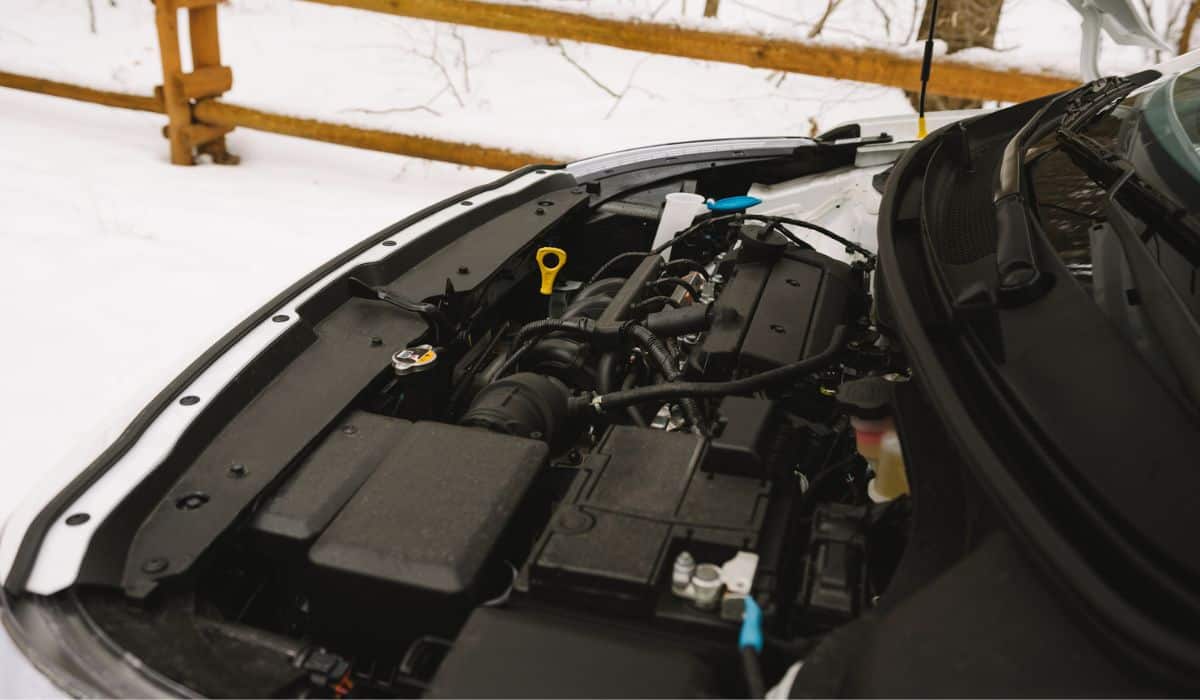How Does Cold Weather Affect Car Engines?
Cold temperatures impact more than just the environment. You’re not alone if you notice decreases in vehicle performance during the winter. But are performance issues in the winter something to worry about, and should you get your engine checked out in cold conditions?
Cold weather causes the engine to work harder and can lead to premature wear or damage. Oil is thicker in the cold, causing it to be a less effective lubricant. Cold weather also impacts the coolant, which can lead to overheating, internal damage, engine cracks, seizing, and more.
Don’t panic if you notice performance issues in the winter. Although performance reductions are expected, it’s best to practice caution to keep your car in tip-top shape. Let’s take a deeper look at how cold weather affects your engine and what you can do about it.
How Does Cold Weather Affect Car Engines?

Cold weather affects vehicles in several ways. Besides slick tires and frozen windshields, low temperatures cause your engine to work harder. Motor oil is thicker in low temperatures, causing it to be a less effective lubricant.
Less effective oil can cause internal damage, engine stalling, and other issues. Additionally, cold temperatures can affect the coolant and cause cracks in the engine block in severe cases.
Here’s a breakdown of how cold weather affects your vehicle:
Lubricant Issues
Low temperatures cause vehicle fluids — like transmission fluid, antifreeze, wiper fluid, and oil — to thicken. Thick oil is the most significant concern, as it’s less effective and causes performance issues compared with thinner oil.
Thick oil isn’t as effective at lubricating the engine’s moving parts. Without proper lubrication, your car’s engine’s internal components begin to wear out faster.
Some drivers and mechanics recommend switching to low-viscosity oil, like fully synthetic products, to help prevent thickening issues.
Coolant Issues and Overheating
Coolant and antifreeze are other fluids that are impacted by low temperatures. Coolant plays an integral role in your vehicle’s cooling system and prevents corrosion, cavitation, freezing, deposit build-ups, and overheating.
If your cooling system fails, the engine, radiator, water pump, engine block, and head gasket can start to fail as well.
And although it might seem counterintuitive, your car may be more likely to overheat in colder temperatures. This is because the coolant is less effective at reducing the heat created by the moving engine components. If the heat gets too extreme, the internal parts can degrade and wear out faster.
How Cold is Too Cold for a Car?
So, cold temperatures can negatively impact your car, but how cold is too cold?
Several components in a vehicle can encounter problems at different temperature ranges. That said, vehicle parts can start to have issues or freeze at temperatures 32 F (0 C) and lower.
Some of the problems you might face at these temperatures include the following:
- Battery issues: Many experts suggest that temperatures lower than 32 F can cause the battery to fail or wear out prematurely. In fact, 32 F can cause car batteries to lose upwards of 35% of their power, while 0 F causes upwards of 60% power reduction.
- Tires inflation problems: Lower temperatures also impact tire inflation levels. Cold air contracts, causing fluctuating tire levels. It’s crucial to frequently check your tire pressure in the winter months. Underinflated tires can be a safety hazard, especially on wet or slippery roads.
- Frozen fuel lines: Moisture in the fuel lines can start to freeze in colder temperatures, around -40 F to -200 F, which can cause harmful clogs. It’s advised to have at least a tank of gas in the winter to prevent frozen fuel line issues.
- Frozen windshield wipers: Another issue that can be overlooked in colder temperatures are frozen windshield wipers. Damage to the windshield wipers can be a safety hazard, especially when visibility is vital. Don’t force your windshield wipers if frozen, as this might cause further issues.
Although there isn’t a one-size fits all answer for what temperatures to avoid, cold conditions will undoubtedly impact your vehicle’s performance. All car’s are different, and your mileage will vary, but practice caution in temperatures below 32 F. It might be best to avoid starting your cat at all temperatures of -4 F or lower.
How to Prevent Engine Damage in the Cold

Freezing temperatures can impact your car’s performance and cause premature damage to the engine if you aren’t cautious. Fortunately, many winter issues can be mitigated with preventative measures.
Here’s what you can do to prevent engine damage in cold weather:
Switch to Low-Viscosity Oil
One standard recommendation is to switch to low-viscosity or fully-synthetic oil during cold temperatures. Low temperatures and freezing conditions cause oil to become thick. Thicker oil is a less effective lubricant and will impact your car’s performance over time.
Low-viscosity oil and regular changes may help mitigate oil thickening in the winter. That said, always follow your owner’s manual for recommendations and maintenance instructions.
Check Your Coolant
Cold temperatures negatively impact the coolant in your vehicle, causing performance issues and risks of damage. It’s crucial to frequently check your coolant levels during the winter to prevent internal damage, overheating, and engine seizing.
Don’t Warm Up Your Car in the Morning
Allowing your car to warm up in the morning used to be common practice but is no longer recommended for newer vehicles. Newer vehicles are equipped with elegant fuel sensors that determine the correct ratio of fuel and air to send to the engine.
If you allow your vehicle to idle for too long, you risk feeding more gasoline-rich fuel that can affect the lubrication and lead to stripping oil from internal components.
Instead, start your car and begin driving it to warm it up. Your vehicle will reach its normal operating temperature in about five to 15 minutes, alongside the heater and seat warmers.
Park Under Cover
Use covered parking in colder conditions to protect your car from the elements, if possible. Covered parking can help reduce excessive snow, frost, and other debris from accumulating on your vehicle. You may have an easier time defrosting your windshield and commuting with this method.
Conduct Proper Maintenance
It’s crucial to conduct proper maintenance and routine service, regardless of the climate. Take your vehicle for regular services to prepare it for the winter. Ensure you’re up to date on oil and fluid changes. Tune-ups, inspections, and winter tires can help keep your vehicle in tip-top shape during cold weather.
